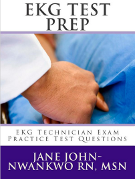There are no rules or regulations that outline the EKG technician training and certification requirements in Missouri. While state agencies have chosen not to regulate this profession, many employers develop their own standards for those who wish to apply for open positions. In general, healthcare administrators prefer to hire individuals who have previous experience with direct patient care and who understand the unique challenges associated with working in a medical setting that can be fast-paced and sometimes demanding.
Delegation Regulations
As is true in many other states, an EKG technician is commonly classified as an unlicensed assistive person (UAP) who must be supervised when performing certain nursing tasks. The Missouri Board of Nursing refers to policies that have been developed by national nursing associations as far as unlicensed personnel are concerned. According to the state, registered nurses are allowed to teach, delegate, and supervise unlicensed personnel in the performance of certain nursing care tasks. Registered nurses and licensed practical nurses must make reasonable and prudent judgments regarding the appropriateness of delegating selected nursing care tasks to unlicensed health care workers. Licensed nurses must ensure that unlicensed health care personnel have documented, demonstrated evidence of appropriate education, training, skills, and experience to accomplish the task safely.
The Missouri Board of Nursing refers to the guidelines for delegation adopted by the National Council of State Boards of Nursing (NCSBN) to help guide nurses through the delegation decision-making process. The NCSBN has created the five rights of delegation (right task, right person, right direction and communication, right circumstances, and right situation) to help nurses evaluate whether or not a task should be delegated to unlicensed personnel. The nurse is required to retain accountability for the health outcomes that result from the delegation of tasks and must assess the condition of the patient and the competence of the EKG technician before allowing the technician to administer care. Because there is a tremendous amount of liability associated with health outcomes, most employers have systems in place to ensure that their technicians are qualified to perform the tasks that they are assigned.
Education and Training Requirements
There are few colleges and universities that offer accredited EKG technician training programs in Missouri. The lack of formal educational programs for technicians is largely reflective of the fact that the profession is not licensed by the state. Although some institutions do have short certificate programs that provide the basic knowledge and skills to enter the profession, many employers require new technicians to successfully complete an in-house training program that is designed to orient individuals to the unique demands of the cardiac care unit. While it never hurts to complete a certificate program, it is always important to contact potential employers about your intentions before spending the money on such a program. Some technicians discover that a certificate may not be necessary when an employer has designed their own training program.
Individuals may find that it can be a struggle to compete for a position as an EKG technician without having provided direct patient care in a more generalized area of practice. This may happen because administrators prefer to hire technicians who understand the nuances of a fast-paced healthcare setting and who have a track record of high quality and compassionate care. If you are finding it difficult to enter the profession, it may be a good idea to consider working as a nursing aide or medical assistant for a few years to strengthen your resume.
State Contact Information
Phone: (573) 751-6400
Fax: (573) 751-6010
Email: info@health.mo.gov
 912 Wildwood, PO Box 570 Jefferson City, MO 65102
912 Wildwood, PO Box 570 Jefferson City, MO 65102
Phone: (573) 751-0681
Fax: (573) 751-0075
Email: nursing@pr.mo.gov
3605 Missouri Blvd., PO Box 656 Jefferson City, MO 65102





